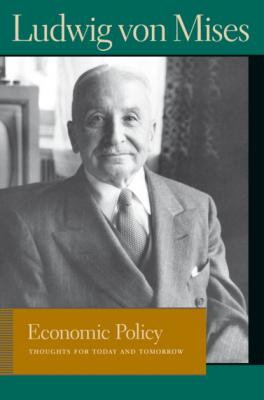ТОП просматриваемых книг сайта:
Economic Policy. Людвиг фон Мизес
Читать онлайн.Название Economic Policy
Год выпуска 0
isbn 9781614871460
Автор произведения Людвиг фон Мизес
Жанр Экономика
Серия Liberty Fund Library of the Works of Ludwig von Mises
Издательство Ingram
The scornful depiction of capitalism by some people as a system designed to make the rich become richer and the poor become poorer is wrong from beginning to end. Marx’s thesis regarding the coming of socialism was based on the assumption that workers were getting poorer, that the masses were becoming more destitute, and that finally all the wealth of a country would be concentrated in a few hands or in the hands of one man only. And then the masses of impoverished workers would finally rebel and expropriate the riches of the wealthy proprietors. According to this doctrine of Karl Marx, there can be no opportunity, no possibility within the capitalistic system for any improvement of the conditions of the workers.
In 1864, speaking before the International Workingmen’s Association in England, Marx said the belief that labor unions could improve conditions for the working population was “absolutely in error.” The union policy of asking for higher wage rates and shorter work hours he called conservative—conservatism being, of course, the most condemnatory term which Karl Marx could use. He suggested that the unions set themselves a new, revolutionary goal: that they “do away with the wage system altogether,” that they substitute “socialism”—government ownership of the means of production—for the system of private ownership.
If we look upon the history of the world, and especially upon the history of England since 1865, we realize that Marx was wrong in every respect. There is no western, capitalistic country in which the conditions of the masses have not improved in an unprecedented way. All these improvements of the last eighty or ninety years were made in spite of the prognostications of Karl Marx. For the Marxian socialists believed that the conditions of the workers could never be ameliorated. They followed a false theory, the famous “iron law of wages”—the law which stated that a worker’s wages, under capitalism, would not exceed the amount he needed to sustain his life for service to the enterprise.
The Marxians formulated their theory in this way: if the workers’ wage rates go up, raising wages above the subsistence level, they will have more children; and these children, when they enter the labor force, will increase the number of workers to the point where the wage rates will drop, bringing the workers once more down to the subsistence level—to that minimal sustenance level which will just barely prevent the working population from dying out. But this idea of Marx, and of many other socialists, is a concept of the working man precisely like that which biologists use—and rightly so—in studying the life of animals. Of mice, for instance.
If you increase the quantity of food available for animal organisms or for microbes, then more of them will survive. And if you restrict their food, then you will restrict their numbers. But man is different. Even the worker—in spite of the fact that Marxists do not acknowledge it—has human wants other than food and reproduction of his species. An increase in real wages results not only in an increase in population, it results also, and first of all, in an improvement in the average standard of living. That is why today we have a higher standard of living in Western Europe and in the United States than in the developing nations of, say, Africa.
We must realize, however, that this higher standard of living depends on the supply of capital. This explains the difference between conditions in the United States and conditions in India; modern methods of fighting contagious diseases have been introduced in India—at least, to some extent—and the effect has been an unprecedented increase in population but, since this increase in population has not been accompanied by a corresponding increase in the amount of capital invested, the result has been an increase in poverty. A country becomes more prosperous in proportion to the rise in the invested capital per unit of its population.
I hope that in my other lectures I will have the opportunity to deal in greater detail with these problems and will be able to clarify them, because some terms—such as “the capital invested per capita”—require a rather detailed explanation.
But you have to remember that, in economic policies, there are no miracles. You have read in many newspapers and speeches, about the so-called German economic miracle—the recovery of Germany after its defeat and destruction in the Second World War. But this was no miracle. It was the application of the principles of the free market economy, of the methods of capitalism, even though they were not applied completely in all respects. Every country can experience the same “miracle” of economic recovery, although I must insist that economic recovery does not come from a miracle; it comes from the adoption of—and is the result of—sound economic policies.
Конец ознакомительного фрагмента.
Текст предоставлен ООО «ЛитРес».
Прочитайте эту книгу целиком, купив полную легальную версию на ЛитРес.
Безопасно оплатить книгу можно банковской картой Visa, MasterCard, Maestro, со счета мобильного телефона, с платежного терминала, в салоне МТС или Связной, через PayPal, WebMoney, Яндекс.Деньги, QIWI Кошелек, бонусными картами или другим удобным Вам способом.

